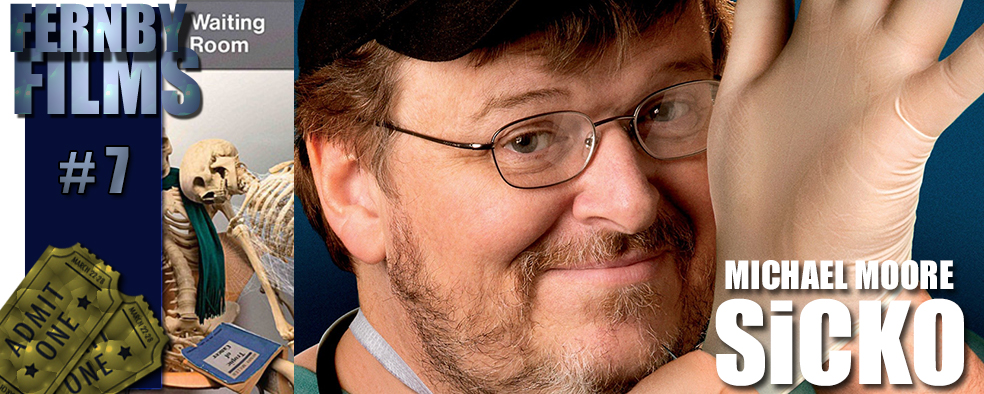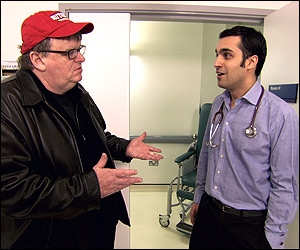Movie Review – Sicko

Recently, my wife Lisa and I watched Michael Moore’s “controversial” new doco, Sicko. Purporting to show the dreadful state the US health system is currently in, Sicko is a heart wrenching, often jaw dropping attempt to find some sense of justice and even-handedness in the HMO system [Health Maintenance Organisation] the US employs. To be honest, anybody who has ever watched an episode of ER, Grey’s Anatomy or even House will understand just how important health insurance is in the US medical system. If you do not have health insurance, you don’t get medical help.

Moore has constructed, with the American public’s help, a scathing attack on the US health system which sees people as money, not as human beings. Not being in the US, and not having the same system here (thankfully), this film nevertheless made my blood boil at the prospect of somebody’s well-being and general health during a time of medical woe being utterly dependent on how deep you pockets are. Lisa was sitting next to me shaking her head and grinding her teeth the entire film. Lisa, for those who don’t know her, is a registered nurse, working at a hospital here in Adelaide. She saw red at just about every turn with this one.
The reason Moore’s film is “controversial” is that many people, especially those working at an HMO, will look at this film as an attack on their profits, their company and shareholders. They wont like it. But then, when you are ripping people off every single day, making billions of dollars out of people who probably cannot afford it, of course you don’t want anybody rocking the boat (and its a bloody big boat, let me tell you!); you especially don’t want somebody of Michael Moore’s wattage swaggering into your backyard and kicking over the skeletons. [Sorry, mixing my metaphors there!] People are ready to tear down this film as an exercise in scaremongering or propaganda. But I always say…. if you see smoke… somewhere there’s a fire burning.
Moore takes the case of some typical, hard-working American citizens, and puts their stories under the microscope. Most have been given a bad rap by the HMO’s, even driven to bankruptcy.

Moore portrays the HMO as an unfeeling, uncaring, unseen entity through which are forms, regulations, impersonal telephone prompts and other bureaucratic nonsense; it’s hard to believe that humans can get away with perpetrating these crimes on other humans. All without the government doing a thing! But wait, according to Moore, the government is in on the act.
HMO’s, according to the film, work like a regular insurance company, charging premiums for the off-chance that you get sick, have an accident, or attend a Doctor or hospital with some kind of issue. They are privately run, like large corporations, so of course, they are watching the bottom line. And as with any corporation, watching the bottom line and ensuring you remain with figures dipped in black ink, rather than red, is the modus operandi from which Capitalism stirs. Of course, the bottom line figures importance far outweighs the plight of the poor fellow who just lost two fingers in a buzzsaw accident. Heck, when he rocks up to the hospital, you tell him he can only have one finger sewn back on, because his cover… well, doesn’t cover him for two fingers. Charge him $12,000 to sew on his ring finger, or $60,000 to sew on the index finger. Hmm. Yep, those figures are lifted straight out of the film.
But for me, above all else in Sicko, the most poignant and unforgivable scene relates to the heroic people who worked as rescue personnel at Ground Zero after 9/11. Most of the chemicals, particles and related material found at Ground Zero was toxic, poisonous and utterly destructive to anybody breathing it in. Of course, those who worked at the site are only now discovering cancers and other medical issues that doctors can pinpoint directly to the 9/11 attacks. You think an HMO will cover you for that? Possibly, if you have the right cover, live in the right street and have the right haircut.

Moore attempts to get some medical help for them; simple, straightforward tests that my wife tells me take no more than a few minutes (she’s a nurse, remember, so she would know this kind of stuff!) and ends up in Cuba, trying to get help at Guantanamo Bay Prison facility. Why? Because the prisoners there, including former detainee David Hicks, get round the clock medical care should they need is, at the expense of the American taxpayer.
Make sense yet? This is the kind of kooked out crazy that’s turned America into the cesspit of shootings, violence and desperation that has become so ingrained its almost impossible to reverse. People who were living through the most hellish conditions on the planet in New York City on 9/11, are struggling to receive any medical help for their related conditions, while the perpetrators get so much as a sniffle and they get all the drugs known to man, should they require it.
Okay, so Moore is not well known for his balanced and fair reporting. But even if half this stuff is true, it’s still a pretty damning report.
The film itself is entirely unremarkable for its visual style. Unlike the bravura style of Bowling For Columbine, or even the heavy handedness of Farenheit 9/11, Sicko feels more like an extended segment of A Current Affair. It’s fly-on-the-wall approach is almost painfully intimate, so much so that several moments will surely bring tears to your eyes. Moore is so disarming, half the time his narration feels like he’s apologising for showing you what he does.
While I would not say that Sicko is a film one can enjoy in the classic sense, it is certainly a film you can watch if you ever want to have an inkling of just how good we have it outside the mighty United States.




